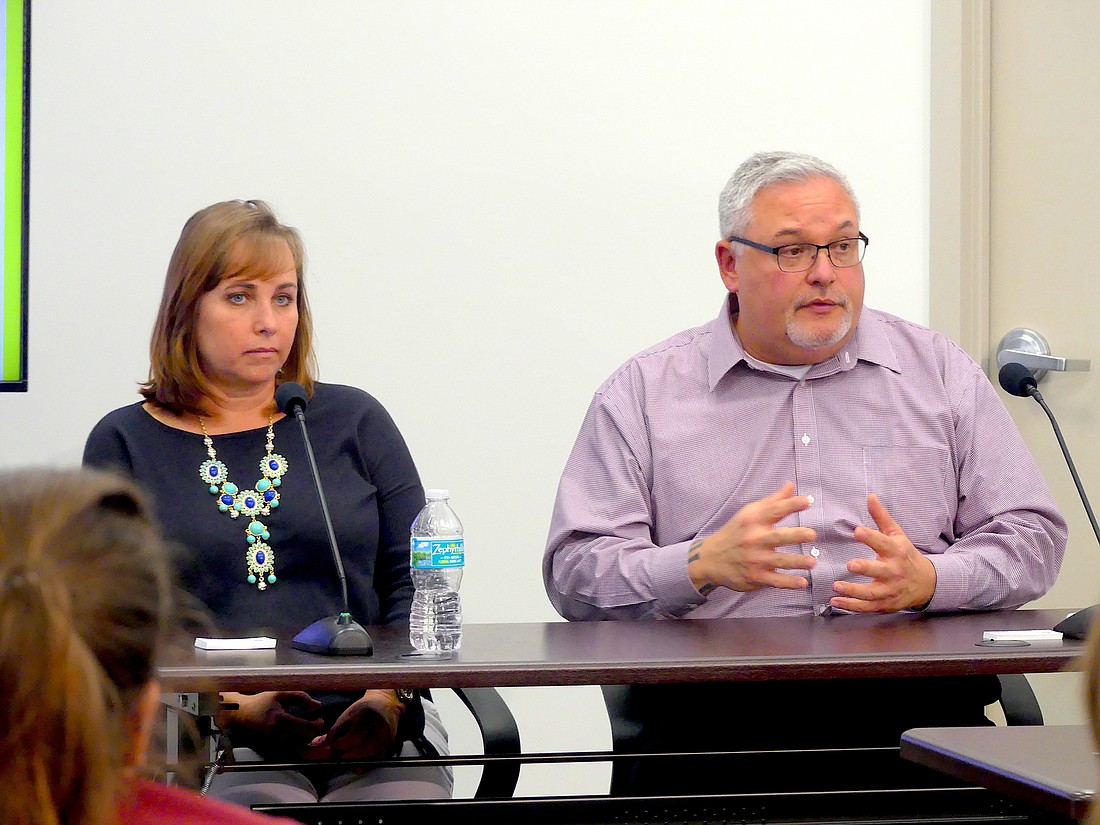
About 50 Jacksonville Bar Association members got an inside look at The Florida Bar Grievance Committee process on Jan. 8 at the JBA offices at Wells Fargo Center.
The CLE seminar and a panel discussion, moderated by D.W. Perkins President Latoya Williams Shelton, was sponsored by the JBA and the D.W. Perkins Bar Association.
The panel comprised Carlos Leon, Bar counsel in the Lawyer Regulation department at The Florida Bar; Staff Investigator Camille Burban; Amber Donley, former chair of one of the two 4th Judicial Circuit Grievance Committees; The Florida Bar board of governors 4th Circuit representative and designated grievance reviewer Michael Tanner; attorney Sheldon Vann; and JBA Executive Director Craig Shoup.
The committee members are volunteers and at least one-third are not lawyers. Each of Florida’s 20 judicial circuits has one or more committees.
Grievance committees review complaints brought against attorneys with much the same purpose as a grand jury. The committee decides, after a case is submitted to them by Bar counsel, whether there is probable cause to believe a lawyer violated the professional conduct rules imposed by the Supreme Court of Florida and whether discipline against the lawyer appears to be warranted.
Discipline can range from admonishment to public reprimand, up to three years’ suspension or, if the infraction reaches a certain level, disbarment and removal from the profession.
Leon said most complaints against Florida’s attorneys end in the initial review phase.
“The majority of what we see – about 80% – are unsubstantiated allegations,” Leon said.
The Bar has more than 108,000 members; about 5,000 complaints are filed each year.
Burban’s role is to investigate the allegations and report to the committee.
“I feel like I’m the gofer. I gather the facts, but I don’t make decisions. That’s up to the grievance committee,” Burban said.
The committee has broad powers and some discretion, such as recommending that an attorney with a complaint enter a diversion process, such as additional professional development education or substance abuse counseling.
“We’re not trying to rain down fire on anybody,” Donley said.
The state Supreme Court has jurisdiction over attorney disciplinary actions, but has delegated some of the attorney regulation authority to The Florida Bar. The court allows the board of governors to oversee the grievance committees and review recommendations submitted by the committees, Tanner said.
After review, the complaint may be terminated, sent back to the committee for more information or it may be sent to the board’s Disciplinary Review Committee, which may send the matter to the court for judgment.
Leon said Bar rues allow an accused attorney to be represented by counsel during the review process, and about 40% get an attorney.
“If you did something wrong – and it happens – get a lawyer,” he said.
Tanner said short of suspension or disbarment, either of which puts an attorney out of business temporarily or permanently, public reprimand is a severe penalty.
The offender must appear before the board and hear the court’s decision read into the record.
“It is a humiliating and mortifying experience. It’s intended to be,” Tanner said.
Vann is a one-attorney practice with some experience with the Bar’s disciplinary process.
“I’m a Florida Bar investigation survivor,” he said.
Vann was suspended by the court from April 15 to Oct. 11, 2019 for failing to properly maintain records for his trust account, money attorneys hold for their clients, and for failing to respond to the Bar.
Vann said that in retrospect, he should have had a CPA handling his accounting.
“As a solo practitioner, it’s easy to get overwhelmed. I tried to do it myself, but it didn’t work out. Then my records were destroyed,” he said.
Cooperating with the investigators is key to resolving a discipline issue, Vann said.
“I talked extensively to Carlos to be transparent and give the investigators what they asked for. There is nothing more stressful than being investigated by The Florida Bar,” Vann said.
Leon said for the Bar, it isn’t just about investigating charges and ordering disciplinary actions.
“Some people are just rotten, but most aren’t. The Florida Bar is interested in why what happened happened. It can be a somewhat slow process, but we tend to get it right,” he said.
Information about the attorney discipline process is available to the public at floridabar.org/public/acap/